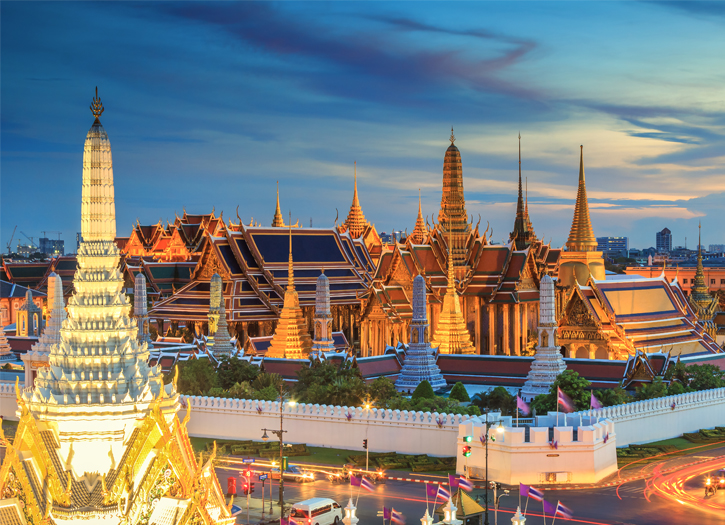The COVID-19 pandemic in Thailand is part of the worldwide pandemic of coronavirus disease 2019 (COVID-19) caused by severe acute respiratory syndrome coronavirus 2 (SARS-CoV-2). The virus was confirmed to have reached Thailand on 13 January 2020, when the country made the first confirmation of a case outside China. Surveillance among incoming travellers revealed a small number of cases throughout January, almost all of whom were visitors or residents returning from China. The first reported local transmission was confirmed on 31 January.
The number of cases remained low throughout February, totaling to 40 confirmed by the end of the month. The number of cases surged in mid-March, which could be traced to several transmission clusters, the largest of which occurred at a Muay Thai fight at the military-run Lumpinee Boxing Stadium on 6 March. Confirmed cases rose to over a hundred per day over the following week, and public venues and businesses were ordered to close in Bangkok and several other provinces.
All commercial international flights were suspended from 4 April, and lockdown measures were implemented in varying degrees throughout the country. The rate of new cases gradually dropped throughout April, and by mid-May, locally transmitted infection rates had fallen to near-zero, and easing of restrictions was gradually implemented. The public has cooperated relatively well with health advisories, and the country’s robust public health infrastructure has been credited as a contributing factor to its relatively successful response to date. However, academia were just reopened in August, and the state of emergency is still in effect.
The government response was initially based on surveillance and contact tracing. Temperature and symptom screening for coronavirus testing was implemented at international airports and hospitals. The government failed to prevent shortages of surgical masks, and became a scandal over perceived corruption and siphoning of supplies by some cabinet members. Travel restrictions were not announced until 5 March, when travellers incoming from “disease-infected zones” were subject to quarantine.
The pandemic has heavily disrupted the country’s economy, of which tourism is a significant sector. The International Monetary Fund has predicted Thailand’s GDP to shrink by 6.7 percent in 2020, a revision from a previous estimated 2.5% increase. The government has borrowed and announced several assistance measures, including cash handouts to those affected and a 1.9 trillion-baht (US$60 billion) stimulus package, though few people have actually received it. Dissatisfaction to its economic impact and government response contributed to the second wave of 2020 Thai protests starting from 18 July 2020.
On 1 March, MOPH reported the first confirmed death in Thailand, a 35-year-old Thai who was originally diagnosed with dengue fever at a private hospital in late January. He was later transferred to Bamrasnaradura Institute on 5 February after testing positive for COVID-19, where he received treatment and had since fully recovered by 16 February. However, the damage the virus had done to his lungs was beyond recovery and he died from multiple organ failure on 29 February. The ministry is currently carrying out investigations to find out which disease is the main cause of his death.
On March 22, Thailand reported 188 new cases, the largest single-day rise since the virus reached the country. Most of the cases are still under investigation. On March 24, three new deaths were announced, all of whom were Thai nationals: a 70-year-old male who had tuberculosis, a 79-year-old male linked to the Lumpinee Boxing Stadium cluster, and a 45-year-old male who had diabetes. Four medical workers were also announced to have been infected with the virus after coming in contact with patients who refused to reveal their travel history while seeking treatment.On 15 July, the national centre for COVID-19 has announced two new infected cases; an Egyptian soldier in Rayong Province, and a Sudanese diplomat’s daughter in Asok neighbourhood of Bangkok.
The government also keep secret the high-risk areas that both patients have been located during their stay until 16 July, infuriating many netizens who were afraid of the possible second outbreak.Even though there had been no new domestic cases since mid-May, on 21 August, the CCSA announced that it decided to extend the Emergency Degree until 30 September.







Add Comment
You must be logged in to post a comment.